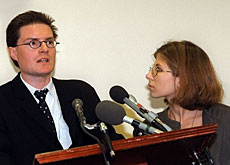
Whistle-blowers inch towards more protection

Employees who reveal corruption within their firms are set to receive greater protection from discrimination thanks to a motion recently passed by parliament.
Watchdogs have applauded a development they hope will bring Switzerland in line with international standards, but there are fears it could create a culture of mistrust or damage the labour market.
The motion cleared a major hurdle when it was finally passed by both houses of parliament on Friday, ending four years of debate. It is now up to the government to recommend how to bring it into law.
Anti-corruption campaigning group Transparency International welcomed the changes made to the original motion.
These allow for higher compensation – currently standing between one and six months’ salary – in case of unfair dismissal and the possibility to extend protection of whistle-blowers to the public sector.
“The existing compensation is too low because a whistle-blower can get a bad reputation, making it difficult to find a new job,” Anne Schwöbel, head of the organisation’s Swiss branch, told swissinfo.
Transparency International set up a anonymous hotline last year to encourage people to report cases of corporate crime.
In many cases, people ringing the hotline fear exposing suspected fraud to bosses in case they are sacked, according to Schwöbel.
Open to abuse
“In other countries such as England or the US whistle-blowing is seen as an important tool against corruption. In Switzerland it is seen as bad because you denounce people, but mentality this has to change,” she said.
The proposed tightening of laws has met with opposition from the rightwing Swiss People’s Party, which fears it could damage the stability of some firms.
“There is a danger that this will create a culture of mistrust within companies that may indirectly affect Switzerland’s economic competitiveness,” party spokesman Roman Jaggi told swissinfo.
The Swiss Business Federation, economiesuisse, is also treating the subject with caution, fearing that whistle-blowing could be abused to cause malicious damage to companies or individuals.
The Federation’s legal expert Thomas Pletscher told swissinfo that any new legislation should not dilute the existing rights of companies to terminate the contracts of their employees.
Crimes undetected
“The motion offers the government the flexibility to implement it in a beneficial rather than a harmful way, but we must wait for their concrete proposals before we know if this will be the case,” he said.
But Dr Zora Ledergerber, an expert in labour law at the Basel Institute on Governance – a non-profit think tank – said new legislation to protect whistle-blowers against unfair dismissal was a step in the right direction.
“Studies have shown that many corporate crimes in Switzerland go undetected,” she said.
“Employees do not get enough protection under the current laws. What Switzerland really needs is an independent body to monitor and prosecute such offences.”
swissinfo, Matthew Allen
The motion to tighten laws protecting whistleblowers against discrimination was first brought by parliamentarian Remo Gysin in 2003.
It had to be amended after the senate said it the proposals were too vague. The new draft was passed by the House of Representatives on Friday paving the way for proposals to turn it into law that will go through a consultation process before being voted on again.
The motion carries the clause that employees must report suspected improprieties to employers first rather than go public with any information.
Former UBS bank night watchman Christoph Meili is Switzerland’s best known whistle-blower.
In 1997 he exposed bank employees who were destroying documents relating to assets held by the bank belonging to deceased Jewish clients. He leaked his evidence to a Swiss Jewish organisation that made his allegations public.
Meili was granted asylum in the US when the Zurich authorities started an investigation into his alleged violation of banking secrecy rules. These investigations were dropped in 1998, but Meili opted to remain in the US.

In compliance with the JTI standards
More: SWI swissinfo.ch certified by the Journalism Trust Initiative





























You can find an overview of ongoing debates with our journalists here . Please join us!
If you want to start a conversation about a topic raised in this article or want to report factual errors, email us at english@swissinfo.ch.